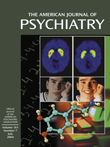Increased Positive Versus Negative Affective Perception and Memory in Healthy Volunteers Following Selective Serotonin and Norepinephrine Reuptake Inhibition
Abstract
OBJECTIVE: Antidepressants that inhibit the reuptake of serotonin (SSRIs) or norepinephrine (SNRIs) are effective in the treatment of disorders such as depression and anxiety. Cognitive psychological theories emphasize the importance of correcting negative biases of information processing in the nonpharmacological treatment of these disorders, but it is not known whether antidepressant drugs can directly modulate the neural processing of affective information. The present study therefore assessed the actions of repeated antidepressant administration on perception and memory for positive and negative emotional information in healthy volunteers. METHOD: Forty-two male and female volunteers were randomly assigned to 7 days of double-blind intervention with the SSRI citalopram (20 mg/day), the SNRI reboxetine (8 mg/day), or placebo. On the final day, facial expression recognition, emotion-potentiated startle response, and memory for affect-laden words were assessed. Questionnaires monitoring mood, hostility, and anxiety were given before and after treatment. RESULTS: In the facial expression recognition task, citalopram and reboxetine reduced the identification of the negative facial expressions of anger and fear. Citalopram also abolished the increased startle response found in the context of negative affective images. Both antidepressants increased the relative recall of positive (versus negative) emotional material. These changes in emotional processing occurred in the absence of significant differences in ratings of mood and anxiety. However, reboxetine decreased subjective ratings of hostility and elevated energy. CONCLUSIONS: Short-term administration of two different antidepressant types had similar effects on emotion-related tasks in healthy volunteers, reducing the processing of negative relative to positive emotional material. Such effects of antidepressants may ameliorate the negative biases in information processing that characterize mood and anxiety disorders. They also suggest a mechanism of action potentially compatible with cognitive theories of anxiety and depression.



